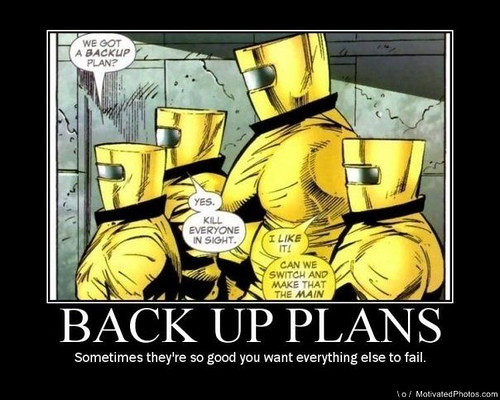The Perils of Plan B: Why Your Back-up Plan Is Holding You Back
The other night I was listening to a webcast from the excellent Amanda Palmer (I predict that her star is on the mainstream rise after the whole naked on the red carpet at the Golden Globes thing) while catching up on some email. At one point in the show, she was responding to Twitter questions from her fans. One of the questions involved advice Palmer might have for aspiring artists. Her words caught my attention and I decided that they would make excellent post fodder.
 Photo by Art La Flamme
Photo by Art La Flamme
In a nutshell, Palmer said not to bother with a Plan B. Convince yourself that what you aspire to will come to pass and give yourself no choice but to succeed. No fallback position, no back-up. In other words, put all your eggs in one basket and guard said basket with your life. Be desperately ambitious and wildly confident and convey that to others, that’s what will make them want to hear you out, to help you. Be ambivalent and everyone can sense it like blood in the water.
Her sentiments ring true, especially for those on high-risk career paths – artists, writers, performers, entrepreneurs, etc. They have an uphill battle to be successful (and I’m conservatively defining success as making a viable living from their craft/business, not being the next J.K. Rowling or Donald Trump) and in fields such as theirs, hunger and perseverance are more important than raw talent. Gotta be a grinder. Arrive earlier, stay later. Outhustle every other hustler. In these cases, having a back-up plan (different from a gotta keep from starving in the here-and-now gig) encourages complacency*. If you know that you can always go back to being a lab tech or a personal trainer, the publish or perish/sing or starve impetus isn’t there. And you’ll end up losing out to the individuals who do have that impetus. They need to succeed; you merely want it. And if doesn’t work out, you know you’ll still be okay. Crisis averted.
But what about the rest of us? Surely, there’s no harm in back-up plans for those of us who are of a more quotidian stripe? Not so fast. Firstly, I think it’s useful to draw a distinction between back-up plans and contingency plans. The former being a viable (and likely more or less palatable) option in case your first choice tanks. Plan B is the Miss America first runner-up. Should Plan A be unable to fulfill its duties for any reason (sex tape scandal!), Plan B shall step seamlessly into the breach. A contingency plan is more of a response protocol to a given event. If X happens, do Y. Think of an elementary school fire drill. If the gym goes up in flames, proceed in an orderly fashion to the parking lot and line up alphabetically by class and grade.
Contingency plans can save you in a jam ($20 in your shoe to take a cab home from an obnoxiously loud and overcrowded party), but Plan Bs are meant to ensure that you don’t end up in the jam in the first place. Why invest fully in Plan A and risk capital F failure (heartbreak, bankruptcy, etc.), when you can simply hedge your bets and bank on good ol’ B to save your bacon? Plan B lets us off the hook. We can put in a little less effort, be a little more moderate in our desire, want it, but not too much and definitely not to an unseemly degree. And if we don’t get it, well, we’ll deal.
Plan B (and C and D, etc.) is born from insecurity. We fear we won’t get what we want the most, that it won’t last, that we don’t deserve it. So we scale back, we downgrade and downplay. If it doesn’t work out, at least we haven’t lost much. But it’s just this mindset that dooms it to not working out in the first place. It’s a self-fulfilling prophecy. We expect less, give less, get less and then praise ourselves for our pragmatism in having a back-up plan to cover just such an outcome, an outcome that we all but conjured into occurring with our 80% effort.
People have varying tolerance levels for risk. I get that. And while not everyone is all about risking it all on a turn of pitch-and-toss, there’s a difference between having a solid idea of what you’ll do if you throw everything you’ve got at your dreams and still fall short and never committing fully to those dreams in the first place because you’ve got a few options on the backburner that you’ve been keeping an eye on. If you choose the latter option, don’t kid yourself about what you’re choosing and don’t be surprised when you end up needing to put your back-up plan into play.
I’m sure Amanda Palmer would agree.
*And you know how I feel about complacency.

Comments are closed.